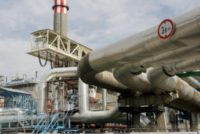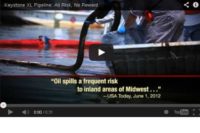PHMSA finds widespread weld problems on Keystone XL pipeline
Opponents calling for investigation, delay in construction
 A report by the federal agency responsible for pipeline safety showing that nearly half of the welds in the Keystone IX’s southern segment need repairs is causing pipeline opponents to call for a halt in construction.
A report by the federal agency responsible for pipeline safety showing that nearly half of the welds in the Keystone IX’s southern segment need repairs is causing pipeline opponents to call for a halt in construction.
Advocacy group Public Citizen, in a letter sent to Congress, is demanding congressional oversight hearings and a thorough investigation of the southern segment of the Keystone XL pipeline following a CBS News report that the U.S. Pipeline and Hazardous Materials Safety Administration (PHMSA) sent letters to pipeline owner TransCanada that on a section of the southern segment known as Spread 3, “205 out of the 425 welds, or 48.2 percent” required repairs.
The Keystone XL’s southern segment runs from Oklahoma through Texas.
Unqualified welders
One of the letters said TransCanada employed a welding process that was not a “previously qualified procedure” and “failed to use properly qualified welders.”
“If there were 205 weld problems in a single section, there could be hundreds more in the rest of the 485 miles of the southern segment,” said Tom “Smitty” Smith, director of Public Citizen’s Texas office.
“There must be an investigation, and crude shouldn’t flow until it is done. The risks of a disastrous spill are enormous for a pipeline that traverses hundreds of streams and rivers, and comes within miles of towns and cities.”
Damaged pipes
In an earlier, Sept. 10 warning letter, PHMSA said field inspectors found dents in pipe that appeared to be the result of rocks in the backfill used around it. The letter said TransCanada did not ensure that the pipe was installed “in a manner that minimizes the possibility of damage to the pipe.”
After reviewing the September PHMSA letters and other PHMSA warning and corrective action letters, Public Citizen spoke with a Washington-based PHMSA public affairs analyst.
The official confirmed that PHMSA had conducted inspections since the letters were sent, but could not provide dates of the inspections, confirm that they focused on the problems identified in the letters, or give an approximate time frame for providing information on the results of the inspections.
The PHMSA letters were reported by CBS as part of a broader story aired last week about the southern section of the pipeline. The CBS report cited Public Citizen’s own investigation on the southern segment, which documented 125 excavations to remedy possible “anomalies,” welds, dents or other problems in the southern segment of the pipeline. (The report is available here.)
In light of the problems identified in the PHMSA letters and the Public Citizen report, Public Citizen calls for several actions:
• PHMSA should enforce correction of the problems identified in its letters, inspect the corrected work, and make the process and results publicly available and readily accessible.
• PHMSA should inspect all of the “anomalies” indicated by the Public Citizen report and make the process and results publicly available and readily accessible.
• Because of the high number of problems identified in the PHMSA letters and the Public Citizen report, PHMSA should inspect the entire southern segment of Keystone XL. PHMSA should conduct a quality assurance review, and since the quality of the welds is critical to ensuring that the pipeline won’t leak or rupture, another hydrostatic test and caliper inline test should be completed before it is filled.
• Congress should conduct oversight hearings to ensure that the pipeline is safe for the public and the environment.
Smith also pointed out that the problems are particularly alarming because of TransCanada’s poor safety record. TransCanada’s Bison natural gas pipeline exploded within the first six months of operation, and the first phase of Keystone XL spilled 14 times in the first 14 months of its operation, according to the State Department’s August 2011 report on the pipeline (“Final Impact Statement for the Proposed Keystone XL Project”).
Looking for a reprint of this article?
From high-res PDFs to custom plaques, order your copy today!






